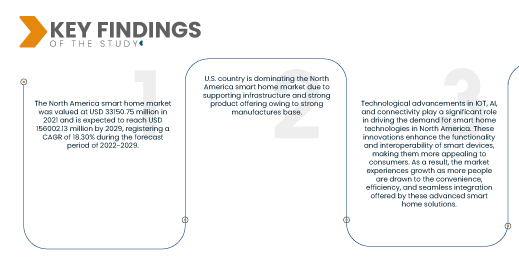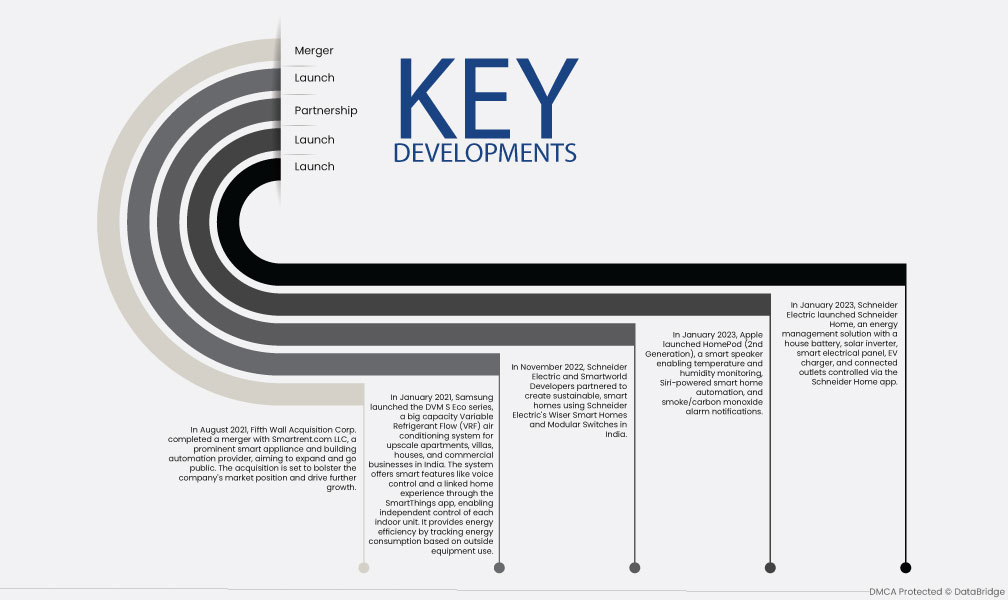스마트 홈은 고급 자동화 시스템의 통합으로 인해 점점 더 인구의 선호를 받고 있습니다. 이러한 주택에서는 온도, 멀티미디어, 엔터테인먼트 시스템, 보안, 온도 조절 장치, 창문 및 문 작동 등 다양한 측면을 편리하게 제어할 수 있습니다. 이러한 기능을 원격으로 관리할 수 있는 기능을 통해 스마트폰 또는 음성 명령을 통해 스마트 홈은 향상된 편안함, 보안 및 에너지 효율성을 제공하므로 보다 연결되고 자동화된 생활 경험을 원하는 현대 주택 소유자에게 매력적인 선택이 됩니다.
전체 보고서 액세스:https://databridgemarketresearch.com/reports/north-america-smart-home-market
Data Bridge Market Research는 다음과 같이 분석합니다. 북미 스마트 홈 시장 2021년 가치는 331억 5075만 달러였으며 2022~2029년 예측 기간 동안 연평균 성장률(CAGR) 18.30%를 기록해 2029년에는 1560억 213만 달러에 이를 것으로 예상됩니다. 등의 스마트 기기의 채택이 증가하고 있습니다. 스마트 스피커, 온도 조절기 및 조명은 북미 지역의 스마트 홈 기술에 대한 수요를 증가시킵니다. 이러한 장치는 편의성, 에너지 효율성 및 향상된 제어 기능을 제공하여 더 많은 소비자가 스마트 홈 솔루션을 수용하도록 장려하고 시장 성장을 주도합니다.
연구의 주요 결과
스마트 홈의 이점에 대한 소비자들의 인식이 높아지면서 시장 성장률이 높아질 것으로 예상됩니다.
에너지 효율성, 편의성, 강화된 보안 등 스마트 홈 자동화의 이점에 대한 소비자들의 인식이 높아지는 것은 북미 스마트 홈 시장의 주요 동인입니다. 사람들이 스마트 장치를 사용하여 집을 관리하는 데 있어 잠재적인 이점과 용이성에 대한 인식이 높아지면서 이러한 기술에 대한 수요가 증가하고 있습니다. 모바일 기기나 음성 명령을 통해 집안의 다양한 측면을 제어할 수 있는 편의성과 능력은 이 지역 시장 확대에 기여합니다.
보고서 범위 및 시장 세분화
|
보고서 지표
|
세부
|
|
예측 기간
|
2022년부터 2029년까지
|
|
기준 연도
|
2021
|
|
역사적인 연도
|
2020(2014-2019까지 맞춤 설정 가능)
|
|
양적 단위
|
수익(백만 달러), 수량(단위), 가격(달러)
|
|
해당 세그먼트
|
제품 유형(엔터테인먼트 제어, 보안 및 액세스 제어, HVAC 제어, 가전제품, 스마트 주방, 조명 제어, 스마트 가구, 홈 헬스케어, 기타), 기술(무선, 유선), 소프트웨어 및 서비스(행동, 사전 대응), 판매 채널(직접, 간접)
|
|
해당 국가
|
북미 지역의 미국, 캐나다, 멕시코
|
|
해당 시장 참여자
|
Honeywell International Inc.(미국), Siemens(독일), Johnson Controls(아일랜드), Axis Communications AB(스웨덴), Schneider Electric(프랑스), ASSA ABLOY(스웨덴), Amazon(미국), Apple Inc.(미국) , ADT(미국), ABB(스위스), Robert Bosch GmbH(독일), Sony Corporation(일본), Samsung(한국), Ooma Inc.,(미국), Delta Controls(캐나다), Comcast(미국), Crestron Electronics Inc.(미국), SimpliSafe Inc.(미국), Armorax(미국), LG Electronics(한국), Lutron Electronics Co., Inc(미국) 및 Legrand(프랑스)
|
|
보고서에서 다루는 데이터 포인트
|
시장 가치, 성장률, 세분화, 지리적 범위 및 주요 플레이어와 같은 시장 시나리오에 대한 통찰력 외에도 Data Bridge Market Research에서 선별한 시장 보고서에는 심층 전문가 분석, 환자 역학, 파이프라인 분석, 가격 분석, 규제 프레임워크.
|
세그먼트 분석:
스마트 홈 시장은 제품 유형, 기술, 소프트웨어 및 서비스, 판매 채널을 기준으로 분류됩니다.
- 제품 유형을 기준으로 스마트 홈 시장은 엔터테인먼트 제어, 보안 및 액세스 제어, HVAC 제어, 가전 제품, 스마트 주방, 조명 제어, 스마트 가구, 홈 헬스케어 등으로 분류됩니다.
- 기술을 기반으로 스마트 홈 시장은 무선과 유선으로 구분됩니다.
- 소프트웨어와 서비스를 기반으로 스마트 홈 시장은 행동형, 능동적형으로 분류됩니다.
- 스마트 홈 시장은 판매 채널을 기준으로 직접 시장과 간접 시장으로 구분됩니다.
주요 플레이어
Data Bridge Market Research는 북미 스마트 홈 시장의 주요 북미 스마트 홈 시장 참가자로 다음 회사를 인식합니다. Honeywell International Inc.(미국), Siemens(독일), Johnson Controls(아일랜드), Axis Communications AB(스웨덴), Schneider Electric(프랑스), ASSA ABLOY(스웨덴), Amazon(미국), Apple Inc.(미국), ADT(미국),
시장 개발
- 2023년 1월, 슈나이더 일렉트릭은 가정용 배터리, 태양광 인버터, 스마트 전기 패널, EV 충전기, 슈나이더 홈 앱을 통해 제어되는 연결된 콘센트를 갖춘 에너지 관리 솔루션인 슈나이더 홈을 출시했습니다.
- 2023년 1월, Apple은 온도 및 습도 모니터링, Siri 기반 스마트 홈 자동화, 연기/일산화탄소 경보 알림을 지원하는 스마트 스피커인 HomePod(2세대)를 출시했습니다.
- 2022년 11월, Schneider Electric과 Smartworld Developers는 인도에서 Schneider Electric의 Wiser 스마트 홈 및 모듈형 스위치를 사용하여 지속 가능한 스마트 홈을 만들기 위해 파트너십을 맺었습니다.
- 2021년 1월, 삼성은 인도의 고급 아파트, 빌라, 주택 및 상업용 비즈니스를 위한 대용량 VRF(가변 냉매 흐름) 에어컨 시스템인 DVM S Eco 시리즈를 출시했습니다. 이 시스템은 SmartThings 앱을 통해 음성 제어 및 연결된 홈 경험과 같은 스마트 기능을 제공하여 각 실내기를 독립적으로 제어할 수 있습니다. 외부 장비 사용에 따른 에너지 소비량을 추적하여 에너지 효율성을 제공합니다.
- 2021년 8월 Fifth Wall Acquisition Corp.은 저명한 스마트 기기 및 빌딩 자동화 제공업체인 Smartrent.com LLC와의 합병을 완료하여 확장 및 상장을 목표로 하고 있습니다. 이번 인수를 통해 회사의 시장 지위를 강화하고 추가 성장을 촉진할 예정입니다.
지역분석
지리적으로 북미 스마트 홈 시장에 포함된 국가는 북미에서 미국, 캐나다 및 멕시코를 보고합니다.
Data Bridge 시장 조사 분석에 따르면:
미국이 압도적이다 북미 스마트홈 시장 예측 기간 2022~2029년 동안
미국은 강력한 인터넷 연결과 IOT 기술의 광범위한 채택을 포함하여 잘 발달된 인프라로 인해 북미 스마트 홈 시장을 지배하고 있습니다. 또한 이 나라는 고품질 스마트 홈 장치의 생산을 지원하는 강력한 제조 기반의 혜택을 누리고 있습니다. 또한 미국 시장은 다양하고 광범위한 스마트 홈 제품을 제공하여 소비자의 진화하는 요구를 충족하고 북미 스마트 홈 산업의 전반적인 성장을 주도하고 있습니다.
북미 스마트 홈 시장 보고서에 대한 자세한 내용을 보려면 여기를 클릭하세요. https://www.databridgemarketresearch.com/reports/north-america-smart-home-market














